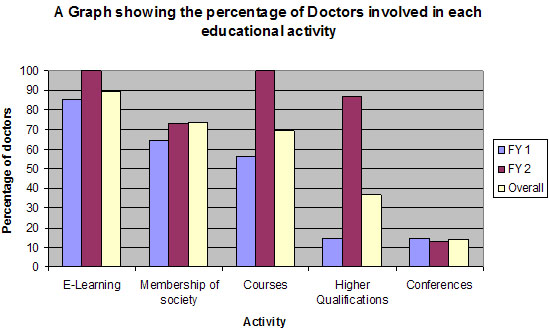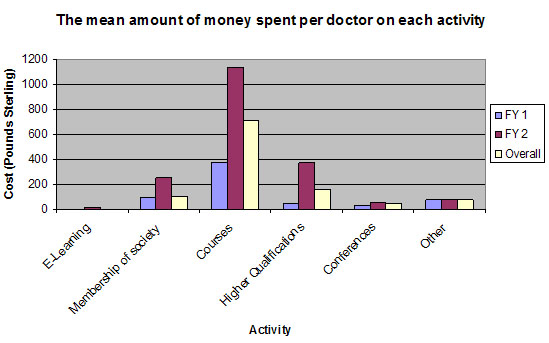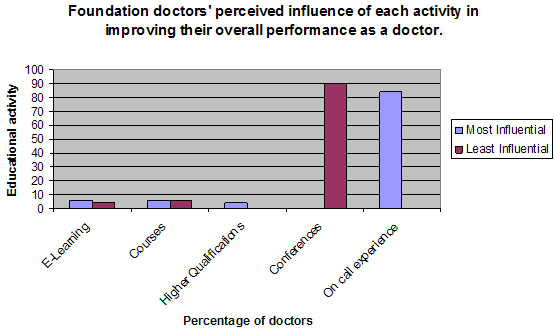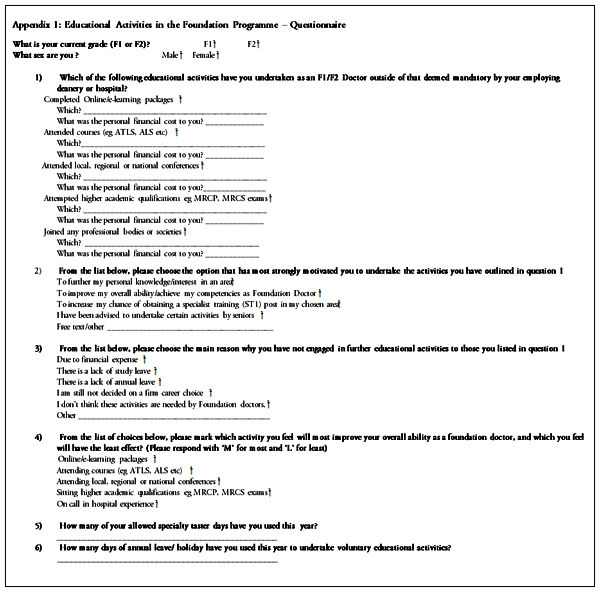MJ Keogh, JM Findlay, S Sithamparanathan and D Matheson
Abstract
The Foundation Programme details the first two years of training for UK doctors in the UK. Thereafter, trainees are expected to apply for highly competitive specialist training posts. Our study aimed to clarify and quantify the educational activities currently used by Foundation doctors during this two year period, and to assess their motivational and deterring factors towards such educational activities.
Method: A fourteen point questionnaire was posted at random to 100 Foundation Year 1 and 2 (50 FY1 and 50 FY2) doctors across five Trent Deanery hospitals. The questionnaire assessed involvement in the following voluntary educational activities: courses, conferences, higher qualifications, e-learning packages and personal reading. It also sought their underlying attitudes.
Results: Response rate was 49.0% (49/100), comprising 34 (68%) FY1 and 15 (30%) FY2. Overall 89.8% of respondents engaged in voluntary educational activities. The most common (89.8%) was the e-learning package (FY1 85.3%, FY2 100%) followed by society membership (73.5% (FY1 64.7%, FY2 93.3%), courses (69.4%) (FY1 55.9%, FY2 100%), sitting higher qualifications (36.7%) (FY1 14.7%, FY2 86.7%) and attending conferences (14.3%) (FY1 14.7%, FY2 13.3%). The mean total cost incurred by doctors for these activities was £581 in FY1 and £1842 in FY2.
The most common deterrents to pursuing voluntary education were a lack of study leave (42.9%) (FY1 38.2%, FY2 53.3%), lack of annual leave (22.4%) (FY1 23.5% FY2 20.0%) and expense (20.4%) (FY1 17.6%, FY2 26.7%).
The most common motivating factor was the belief they would help candidates achieve a specialist training post (67.3%) (FY1 58.8%, FY2 86.7%). Only 8.2% (FY1 11.8%, FY2 0.0%) engaged primarily to improve their medical competence.
Discussion: Our study is the first to quantify the voluntary educational activities of Foundation doctors. Most popular are e-learning packages — outstripping courses, higher qualification revision and conferences — highlighting their increasing popularity as a viable and accessible educational tool. The primary deterrent to pursuing voluntary educational activities is lack of study leave, of concern as entitlements to this continue to decrease. Interestingly, Foundation doctors are not motivated primarily by the educational benefits of these activities, but rather by their perceived ability to help attain a specialist training post. This highlights the concerning potential for voluntary educational activities to become a badge of attendance, undermining their intrinsic educational value and outcome.
|
The implementation of Modernising Medical Careers (MMC) significantly altered the structure of postgraduate medical education in the UK. MMC oversees the training of all UK doctors from the outset of their career, the first two years of which comprise the Foundation Programme. Successful completion of the Foundation Programme is based upon doctors’ Foundation Portfolios in which they must demonstrate achievement of essential competences and work-based assessments. Doctors are also encouraged to attain additional competencies and to develop their portfolio further. Voluntary educational activities undertaken outside the workplace form the basis of this.
Application into Specialist Training following the Foundation Programme is highly competitive, with an average of three applicants for each post in 20081. Points-based shortlisting criteria are used to select candidates, and are based upon the contents of the Foundation Portfolio and application form. This means that points can be scored for activities not required for completion of the Foundation Programme, such as Royal College membership examinations and course attendance. Foundation Programme doctors undertake voluntary activities to improve their portfolios however no quantifiable evidence currently exists as to what doctors undertake in this respect.
We aimed, therefore, to determine firstly what voluntary educational activities Foundation doctors are undertaking. We also aimed to establish their underlying motivating and deterring factors, financial costs incurred, and use of annual and study leave and ‘specialty taster days’, to assess the overall extent and impact of portfolio activities. The authors hope the results are useful in informing medical students and Foundation trainees of the scope of activities of their peers, and in advising supervisors of the activities of their trainees.
Methods
A two page anonymous questionnaire was posted at random to 100 Foundation doctors across five hospitals in East Midlands Deanery (50 Foundation Year 1, 50 Foundation Year 2). See Appendix 1
Demographics
The first section of the questionnaire asked for the sex and grade of respondents (Foundation Year 1 (FY1), or Foundation Year 2 (FY2))
Activities
Respondents were directly asked whether they were attending courses or conferences, using on-line e-learning packages, joining professional bodies/societies or sitting higher professional examinations such as royal college membership examinations/higher degrees.
Cost
Doctors were asked how much money (excluding that of teaching allowances) and days of annual leave they used on the above activities. They were also asked how many of their allowed ‘specialty taster days’ they had taken during each year.
Motivating and deterring factors
Doctors were asked to rank from a list the motivating and deterring factors determining what activities they were undertaking.
Professional development
Doctors were finally asked to rank which educational activities they thought would make them a better overall Foundation doctor.
Results
Response rate was 49% with 49 doctors returning the questionnaire. Of these 69.4% (n=34) were Foundation Year 1 (FY1) and 30.6% (n=15) were Foundation Year 2 (FY2), with 53.1% female and 46.9% male.
Activities
Overall 89.8% (n=44) of respondents were engaged in voluntary educational activity (FY1 85.3%, FY2 100%). The most common mode (89.8%, n=44) was e-learning packages (FY1 85.3% (n=29), FY2 100% (n=15)) followed by joining/ becoming a member of professional bodies or societies ie BMA etc (73.5%, n=36) (FY1 64.7% (n=22), FY2 93.3% (n=14)), followed by courses (69.4%, n=34) (FY1 55.9% (n=19), FY2 100% (n=15)), undertaking higher qualifications (36.7%) (FY1 14.7% (n=5), FY2 86.7% (n=13)) and attending conferences (14.3%) (FY1 14.7% (n=5), FY2 13.3% (n=2))– See figure 1.
Fig 1 – A graph to show the percentage of Foundation year 1 and 2 doctors involved in each mode of voluntary educational activity.
Of the courses attended, 25.5% pertained to teaching, 25.5% to advanced life support and 18.0% to surgical skills. The remaining 31% of courses related to a variety of other interests such as anaesthetic skill days, expedition medicine courses, and sub speciality specific courses such as movement disorder workshops and laparoscopic surgery.
Cost
The mean amount spent by Foundation Year 1 Doctors on these activities was £581 (range £0 - £3100) Foundation Year 2 Doctors spent significantly more at £1842 (range £0 - £3500). The mean cost per activity is shown in figure 2.
Fig 2 – A graph to show the mean amount of money spent by foundation year 1 and 2 doctors on each mode of
educational activity.
The mean number of days of annual leave used by doctors for these activities was 2.8 in FY1 and 5.3 in FY2, therefore combining to average 8.1 days in total that would be used over the whole foundation programme. Of their five allowed ‘taster – days’ the mean number attended was 1.3 and 2.9 by FY1 and FY2 doctors respectively. Only 20.4% of doctors took their full entitled allowance.
Motivating and deterring factors
The most common factor motivating Foundation doctors to undertake portfolio educational activities was the belief they would help candidates achieve a specialist training post (67.3%). Only 12.2% engaged primarily out of personal interest with 8.2% to improve their medical competence (See Table 1).
|
Primary Motivating Factor
|
FY1 Doctors
|
FY2 Doctors
|
Overall
|
|
|
Percentage (%)
|
Number
|
Percentage (%)
|
Number
|
Percentage (%)
|
Number
|
|
Improve chance of specialist training post
|
58.8
|
20
|
86.7
|
13
|
67.3
|
33
|
|
Personal interest
|
14.7
|
5
|
6.7
|
1
|
12.2
|
6
|
|
To improve medical competencies
|
11.8
|
4
|
0
|
0
|
8.2
|
4
|
|
On advice of seniors
|
11.8
|
4
|
6.7
|
1
|
10.2
|
5
|
|
Other
|
2.9
|
1
|
0
|
0
|
2
|
1
|
|
TOTAL
|
100
|
34
|
100
|
15
|
100
|
49
|
Table 1 – A table to show the primary motivating factors of foundation doctors to undertake voluntary portfolio educational activities.
The most common deterrents were a lack of study leave (42.9%), lack of annual leave (22.4%) and expense (20.4%) (See Table 2).
|
Primary Deterring Factor
|
FY1 Doctors
|
FY2 Doctors
|
Overall
|
|
|
Percentage (%)
|
Number
|
Percentage (%)
|
Number
|
Percentage (%)
|
Number
|
|
Lack of study leave
|
38.2
|
13
|
53.3
|
8
|
42.9
|
21
|
|
Lack of annual leave
|
23.5
|
8
|
20
|
3
|
22.4
|
11
|
|
Financial expense
|
17.6
|
6
|
26.7
|
4
|
20.4
|
10
|
|
Lack of career choice
|
11.8
|
4
|
0
|
0
|
8.2
|
4
|
|
Not relevant to Foundation doctors
|
8.8
|
3
|
0
|
0
|
6.1
|
3
|
|
Other
|
0
|
0
|
0
|
0
|
0
|
0
|
|
TOTAL
|
100
|
34
|
100
|
15
|
100
|
49
|
Table 2 – A table to show the primary deterring factors listed by foundation doctors that deter them from undertaking voluntary educational portfolio activities.
Professional development
The final section of the questionnaire asked respondents which educational activity they felt was most influential in making them a better Foundation doctor. Interestingly 83.7% (n=41)(FY1 88.2% (n=30), FY2 73.3%( n=11)) felt on-call experience was most influential, with only 6.1% (FY1 2.9% (n=1), FY2 13.3% (n=2)) citing courses, 6.1 % (FY1 2.9% (n=1), FY2 13.3% (n=2)) e-learning packages and 4.1% (FY1 2.9% (n=1), FY2 6.7% (n=1)) qualifications (Fig 3).
The academic conference was ranked least influential by 89.8% (n=44) (FY1 85.3% (n=29), FY2 100% (n=15)) of respondents, followed by 6.1% (n=3) (FY1 8.8% (n=3), FY2 0.0% (n=0)) citing courses, and 4.8% (FY1 5.8% (n=2), FY2 0.0% (n=0)) e-learning packages (Fig 3).
Fig 3 – The above graph was the response of Foundation doctors when asked which activities they thought were most and least influential in making them a better foundation doctor.
Discussion
This survey suggests that Foundation doctors undertake numerous activities at significant personal expense to expand their portfolios, and are primarily motivated by a belief that this will increase their chance of obtaining higher specialist training posts.
Educational activities and opportunities
The advent of the European Working Time Directive and New Deal document2 have resulted in junior doctors working considerably fewer hours than in previous years. This has led some authors to conclude that the quality of learning opportunities in the working environment has reduced 3 .With 89.8% of Foundation doctors in this survey actively undertaking some form of educational activity outside of work, this suggests that Foundation doctors may be going some way to re-dressing this balance. It may also come as a surprising yet reassuring figure to Foundation Programme educational supervisors who may be unaware of the education of their trainees outside of work.
We found the most popular mode of educational activity to be the e-learning package. E-learning is an effective and extensively employed method for both distance learning4 , and as an adjunct to “traditional” lecture-based techniques across several disciplines. It has also been shown to be a well received and practical method of supplementary education for doctors5 and our study suggests this is particularly true for the Foundation years. The reasons why e-learning is popular in this group was not explored, but its low cost, easily accessible and modular nature may have some part to play. As medical schools continue to utilise this modality to a greater extent, its follow-through into the Foundation years and postgraduate medical education in general is inevitable. With such high uptake, e-learning packages are a promising format for delivering education to this group.
Popular courses undertaken by Foundation doctors related to obtaining teaching skills, or advanced life support. This suggests that Foundation doctors place a high emphasis on teaching and training, and on recognising and managing acutely ill patients. These are two core objectives of the Foundation Programme. However, one could also argue that doctors undertaking courses outside work to achieve essential competencies casts doubt on the ability of the Foundation Programme to deliver them. We submit that educational supervisors are in a prime position to appraise this issue.
The least popular mode of activity in our survey was the attendance of a medical conference. It was also regarded as least influential by 89.7% of respondents. There is a global shortage of medical academics6, and as conferences serve to introduce junior doctors to academic medicine and research, perhaps academic doctors should take a more prominent role in promoting conferences as an educational activity.
Time and money
Doctors incur the majority of their costs attending courses with Foundation Year 1 and 2 doctors spending £365 and £1120 respectively on this area (fig 2). This highlights the possibility that Foundation doctors may be prone to financial exploitation by a growing number of courses which are often unvalidated. As senior advice was the primary motivating factor for only 10.2% of activities, this suggests that educational supervisors could play a greater role in assessing, appraising and advising their trainees on the courses best suited for them and their professional development.
The overall financial cost incurred for all portfolio educational activities was £581 for FY1 and £1842 for FY2. Whilst previous estimates have been made in this area, this is the first specific to the Foundation Programme and to include non-mandatory outlay, and represents 3 % and 7% of the basic salary for FY1 and FY2 doctors before tax. As our survey found financial expense to be a significant deterrent to portfolio activity (20.4% of respondents), a potentially serious implication is that expense will limit the uptake of postgraduate education in the future. From the authors’ own experience such professional costs are not explained to medical students and that this issue merits more attention in undergraduate education.
A lack of study leave was highlighted as the main deterring factors to educational portfolio activities (42.9%). This is of particular interest as only 20.4% of Foundation doctors use their full ‘taster-day’ entitlement. These ‘taster days’ are a fundamental aspect of the Foundation Programme, offering doctors the opportunity to explore a specialty for up to five days per year. However, whilst doctors fail to utilise them, they take an average of 8.1 days’ annual leave over the two year programme for educational purposes.
The reasons behind this are unclear, but may be due to a lack of awareness of these ‘taster days’. With a lack of study leave hindering educational activities, a potential solution might be for doctors to have the option to utilise ‘taster days’ as a form of study leave.
Professional education and motivation
Between 1998 and 2005, the number of medical students in the UK has risen by 57%7. Increasing numbers of doctors and decreasing working hours may reduce the amount of on-call experience for those in the Foundation Programme. However, it is this on-call experience that is regarded by the vast majority (83.7% in this study) as the most important educational modality in making them a better foundation doctor. Although time and money are perceived as barriers to portfolio educational activities it appears that doctors value this on-call experience above all. With key aims of the Foundation Programme being training and emergency competence, efforts must be made to preserve this experience.
Whilst Foundation doctors are engaging in numerous portfolio activities, their underlying motivations are interesting. It appears this group are primarily motivated not by the educational benefits of these activities, but rather by their perceived ability to help attain a specialist training post. This could suggest that the educational portfolio is at risk of becoming a ‘tick-box’ means for career progression, rather than addressing limitations, exploring interests and aspiring to clinical excellence. This contrasts with the conclusions of the most recent assessment of postgraduate medical education in the UK8.
As competition for jobs appears to be driving Foundation doctors to undertake educational activities it remains unclear whether engaging in these activities to obtain jobs, rather than competencies, reduces their validity and educational outcomes. Furthermore it is unclear whether trainees will be more likely to achieve their overriding aim of obtaining a specialist training post through these activities. Determining the career outcomes of doctors undertaking these activities will provide an evidence base, allowing educational supervisors to optimally advise their trainee in portfolio educational activities.
Conclusions
This is a baseline survey quantifying portfolio educational activities in the Foundation Programme, applicable to trainees and supervisors alike. Whilst the latter are well aware of assessments such as DOPS (Direct Observation of Procedural Skills) and CbD’s (Case-based Discussions), they are often less aware of the voluntary educational activities of their trainees.
Our study would suggest that Foundation Programme doctors are a cohort driven to undertake numerous voluntary educational activities, albeit largely to achieve career progression rather than accrue educational benefit. To this end they undertake activities such as e-learning, courses and higher qualifications at the expense of conferences. For this they spend significant amounts of money and leave, yet continue to site a lack of traditional study leave as a barrier to further educational development. The authors would suggest that further work is needed to develop the role of educational supervisors in the Foundation Programme in harnessing the motivation of their trainees, and guiding them appropriately.
Key Points
· Foundation Doctors spend significant amounts of time and money on voluntary educational activities.
· Foundation Doctors are primarily driven to undertake these activities due to the belief that it will help them obtain specialist training posts.
· A lack of study leave is the primary barrier to voluntary education.
· The academic medical conference is viewed as the activity least likely to improve medical competence, whereas on-call experience is regarded as the most likely.
· Foundation Programme educational supervisors are best placed to guide their trainees towards the most appropriate educational modalities
Competing Interests
None Declared
Author Details
M J Keogh, BMedSci (Hons), BMBS (Hons). Research Fellow, University of Auckland, New Zealand
J M Findlay, BMedSci (Hons), BMBS (Hons). Core Surgical Trainee, John Radcliffe Hospital, Oxford, UK
S Sithamparanathan, BMedSci (Hons), BMBS (Hons) Core Medical Trainee, Surrey, UK
A Looseley, BMedSci (Hons), BMBS. Intensive Care Registrar, Mona Vale Hospital, Sydney, Australia.
D Matheson, Lecturer in Medical Education, University of Nottingham, UK
CORRESPONDENCE: M J KEOGH BMedSci (Hons), BMBS (Hons). Research Fellow, University of Auckland, New Zealand
670 Mount Eden Road,
Auckland,
New Zealand
Email: mikekeogh@doctors.org.uk |
References
1. MMC, Modernising Medical Careers. Specialty competition ratios, 2008. http://www.mmc.nhs.uk/Docs/TABLE%20for%20competion%20ratios%20page%20_2_.pdf.
2. The Department of Health, L., Hours of work of doctors in training; the new deal. 1991.
3. Scallan, S., Education and the working patterns of junior doctors in the UK: a review of the literature. Med Educ, 2003. 37(10): p. 907-12.
4. Sitzmann T, K.K., Stewart D, Wisher R, The comparative effectiveness of web-based and classroom instruction: a meta-analysis. Personnel Psychology, 2006. 59: p. 623-664.
5. Autti T, A.H., Vehmas T, Laitalainen V, Kivisaari L, E-learning is a well-accepted tool in supplementary training among medical doctors: an experience of obligatory radiation protection training in healthcare. Acta Radiol, 2007. 48(5): p. 508-513.
6. Pritchard, L., International rescue. Med Educ, 2005. 39(2): p. 122-4.
7. Higher Education Funding Council for England. Increasing medical student numbers in England (Report 01/31). Bristol: HEFCE, 2001.
8. MMC, MMC Inquiry. Aspiring to excellence. Final report of the Independent inquiry into Modernising Medical Careers led by Professor Sir John Tooke. Aldridge presss, London, 2008.

The above article is licensed under a Creative Commons Attribution-NonCommercial-NoDerivatives 4.0 International License.









